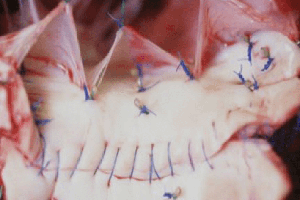Aortic valve opening and closure: the clover dynamics
Abstract
Background: Systolic aortic root expansion is reported to facilitate valve opening, but the precise dynamics remain unknown. A sonometric study with a high data sampling rate (200 to 800 Hz) was conducted in an acute ovine model to better understand the timing, mechanisms, and shape of aortic valve opening and closure.
Methods: Eighteen piezoelectric crystals were implanted in 8 sheep at each annular base, commissures, sinus of Valsalva, sinotubular junction, nodulus of Arantius, and ascending aorta (AA). Geometric changes were time related to pressures and flows.
Results: The aortic root was hemodynamically divided into left ventricular (LV) and aortic compartments situated, respectively, below and above the leaflets. During isovolumetric contraction (IVC), aortic root expansion started in the LV compartment, most likely due to volume redistribution in the LV outflow tract below the leaflets. This expansion initiated leaflet separation prior to ejection (2.1%±0.5% of total opening area). Aortic compartment expansion was delayed toward the end of IVC, likely related to volume redistribution above the leaflets due to accelerating aortic backflow toward the aortic valve and coronary flow reduction due to myocardial contraction. Maximum valve opening during the first third of ejection acquired a truncated cone shape [leaflet free edge area smaller than annular base area (−41.5%±5.5%)]. The distal orifice became clover shaped because the leaflet free edge area is larger than the commissural area by 16.3%±2.0%.
Conclusions: Aortic valve opening is initiated prior to ejection related to delicate balance between LV, aortic root, and coronary dynamics. It is clover shaped at maximum opening in systole. A better understanding of these mechanisms should stimulate more physiological surgical approaches of valve repair and replacement.
Cover






